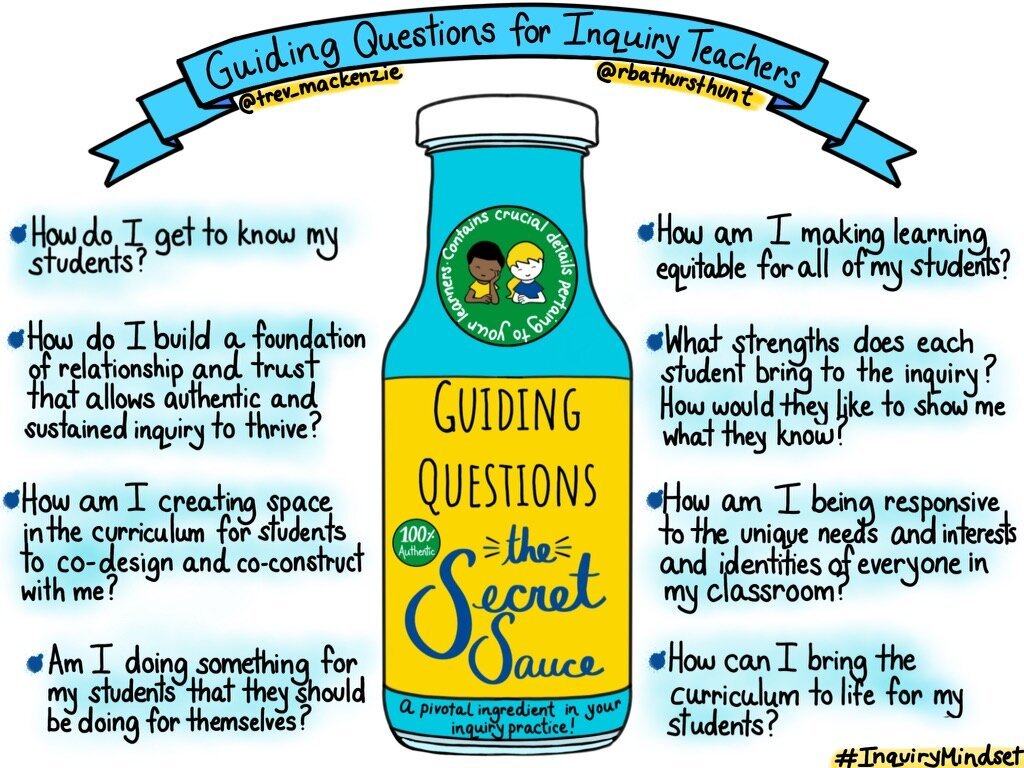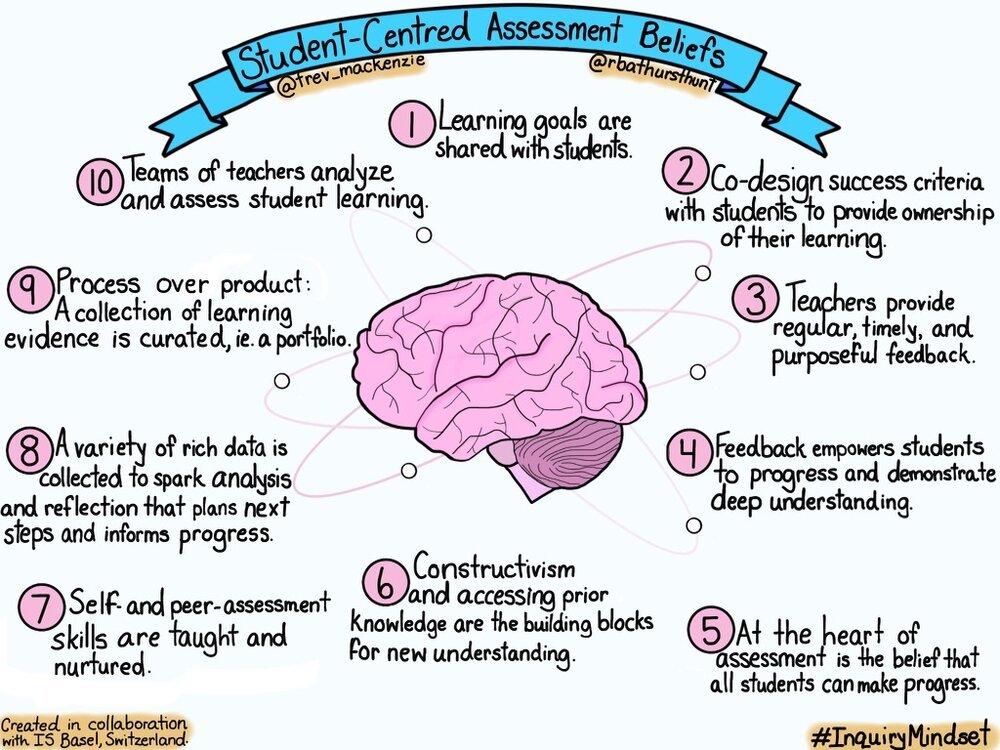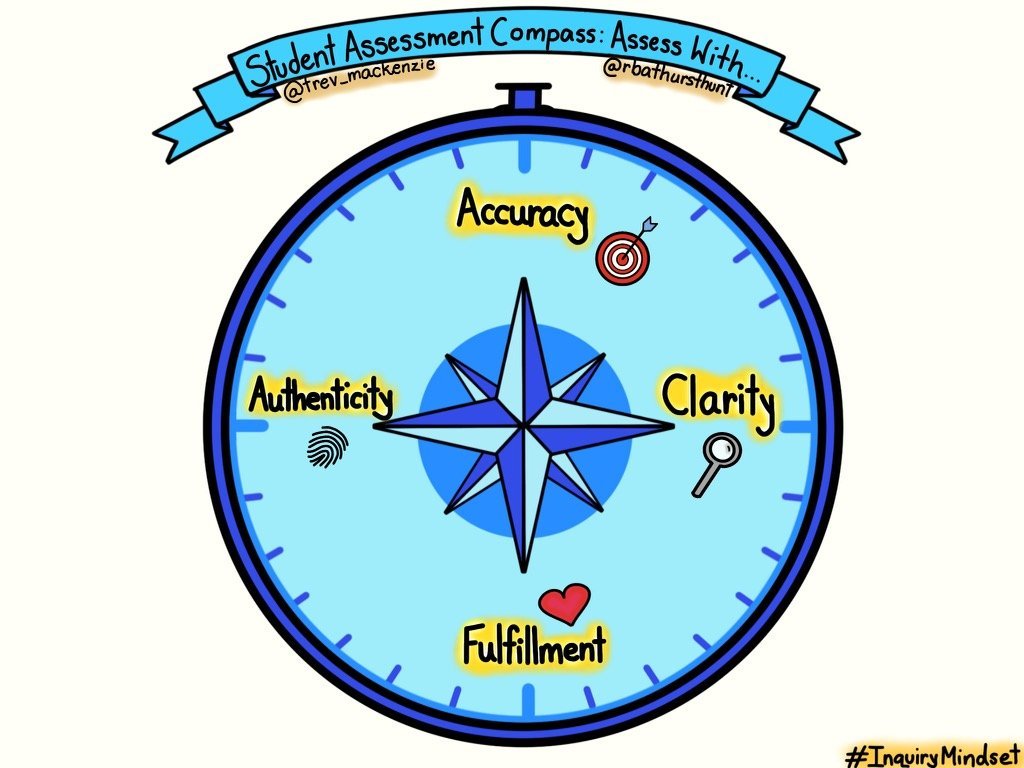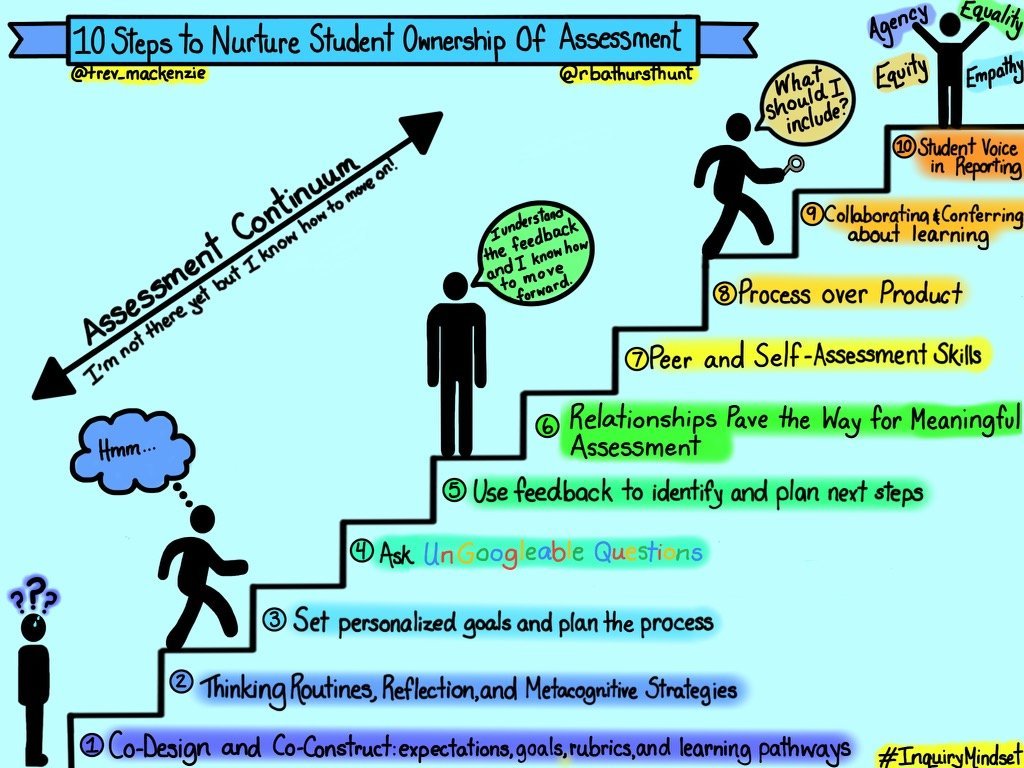Working Portfolio (Part 1) Spring 2023
Learning Statements
“I am learning to create a safe student-centered classroom environment.”
“I am learning how to use assessment to increase student voice, agency, and participation.”
Fig 1: Guiding Questions for Inquiry Teachers Retrieved from: Mackenzie, T. (n.d.). tmac. Sketchnotes. https://www.trevormackenzie.com/sketchnotes.
Fig 2: (Top Left) Stuent-Centred Assessment Beliefs (Top Right) Student Assessment Compass. Assess With… The Inquiry Student (Centre) (Bottom Left) Learner Agency is Out of This World (Bottom Right) 10 Steps to Nurture Student Ownership of Assessment. Retrieved from: Mackenzie, T. (n.d.). tmac. Sketchnotes. https://www.trevormackenzie.com/sketchnotes.
Connections to Educational Theory & Evidence of Growth
Self-Assessment of Program Capacities
WHERE I WOULD LIKE TO GO NEXT
Working Portfolio PowerPoint Presentation
Working Portfolio Written Submission
References
Applewhite, B. (2022, November 25). Diversity, Equity, and Inclusion. Burnaby School District Professional Day Keynote Presentation, Burnaby British Columbia. https://bettereducate.com/uploads/file/48656_ENSLPresentationonEquityBethApplewhitepdf_ENSLPresentationonEquityBethApplewhite.pdf
Brookfield, S. (1995). Becoming a critically reflective teacher. New York: Jossey-Bass.
Christensen, L. (1998). Where I’m From: Writing Students’ Lives into the Classroom. Rethinking Schools Publication, 12(2), 18–22.
Desautels, L. L. (2021). Connections over compliance: Rewiring our perceptions of discipline. Wyatt-MacKenzie
Publishing.
First peoples principles of learning. First Nations Education Steering Committee FNESC. (n.d.). https://www.fnesc.ca/first-peoples-principles-of-learning/
Kist, W. & Semingson, P. (Winter 2017). The Multimodal Memoir Project: Remembering Key YA Texts. 92-97. Learning Modules. Graduate Diploma Materials. Burnaby, BC: Simon Fraser University.
Palmer, P. (1998). The courage to teach: Exploring the inner landscape of a teacher’s life. San Francisco: Jossey-Bass.
Sator, J., A. & Bullock, M., S (2017). ‘Making’ as a catalyst for reflective practice. Reflective Practice, 18 (2), 244-255.
Samaras, A. P. (2011). Ch. 1 Understanding self study. In Self-study teacher research. Los Angeles CA: Sage Publishing.
Strickland , C. M. (2023, March 23). Creatively communicating metacognition and meaning making: The Art of Visual Journaling for learning. reDesign. Retrieved May 5, 2023, from https://www.redesignu.org/creatively-communicating-metacognition-and-meaning-making-art-visual-journaling-learning/ 4 Trevor Mackenzie. Trevor MacKenzie. (n.d.). https://www.trevormackenzie.com/
Presentation Feedback
Crystal, your student centred approach really shows the progression of your inquiry into assessment. Your adaptations in the assessment process has changed significantly along the way. This is clear evidence that your students' voice has increase and as a result, so has their agency and participation. Your critical reflective practice is transforming your role as a teacher. You are shifting from agent to facilitator and collaborator with your students. This is inspiring and insightful work. I look forward to learning more from you as you develop your capacities. Congratulations on completing your first working portfolio.
Kelly Kent , SFU Mentor, June 10, 2023
Written Submission Feedback
Crystal your strength in critical reflection and passion to create a "brave & safe" space for your learners is outstanding. Reflection is indeed where a lot of our learning happens. Bringing your students into the conversation certainly empowers them to develop their own authentic learning processes. The levels of engagement and choice increase when they have freedom to interpret and express for themselves. Your research is comprehensive. You set a tone for authentic inquiry for your students and I am curious to see where they will take you. Peer assessment requires significant trust and front loading. I wonder if there are some innovative and playful ways you can allow them to explore this supportive roll with each other? Congratulations on completing your first working portfolio. Excellent and insightful work Crystal.
Kelly Kent, SFU Mentor, June 11, 2023
Working Portfolio (Part 2) Fall 2023
Learning Statements
“I am learning to create a respectful and socially responsible student-centered learning environment.”
“I am learning strategies for fostering creative, critical, and reflective thinking.”
Working Portfolio # 2 Written Submission
Working Portfolio # 2 Presentation
References
Bennett, M. (2015). The invisible hand of inquiry based learning. Childhood Education 91(5), 388-389. DOI: 10.1080/00094056.2015.1090854
Cajete, G. (2015). Indigenous community: Rekindling the teachings of the seventh fire. Living Justice Press.
Csikszentmihalyi, M. (1990). Flow. New York: Harper & Row.
Bono, D. E. (2017). Six thinking hats. Penguin Life, an imprint of Penguin Books.
Desautels, L. L. (2021). Connections over compliance: Rewiring our perceptions of discipline. Wyatt-MacKenzie Publishing.
Donald, D (2023). Relational Walking Practice. Indigenous Literacy Studies Association. http://www.indigenousliterarystudies.org/relational-walking-practice
Eppic Innovation. (n.d.). https://www.eppicinnovation.com/
Gauntlett, D. (2018) Making is Connecting. Cambridge, MA: Polity Press.
Gillingham, A. and B.E. Stillman (1969) Remedial Training for Children with Specific Disability in Reading, Spelling and Penmanship, Cambridge, USA: Educators’ Publishing Service
Harris, P. (2015). What children learn from questioning. Educational Leadership 73(1), 24-29.
HCTF education. Habitat Conservation Trust Foundation. (2023, December 18). https://hctf.ca/education/
Jensen, E. (2009). Fierce teaching: Purpose, passion, and what matters most. Corwin Press.
Kelly, V. (2010). Finding Face, Finding Heart, and Finding Foundation: Life Writing and the Transformation of Educational Practice. Transnational Curriculum Inquiry 7(2), 82-100.
Kohn, A. (2015). Who’s asking? Educational Leadership 73(1), 16-22.
Larmer, J. & Mergendoller, J. R. (2010, September). Seven essentials for project- based learning. Educational Leadership 68(1), 34-37.
Orton, J.L. (1967) ‘The Orton and Gillingham Approach’, in J., Mooney (Ed.) The Disabled Reader, Baltimore, USA: John Hopkins University Press
Papert, S. (1980). Mindstorms: Children, computers, and powerful ideas. Basic Books
Parrish, N. (2022). The Independent Learner: Metacognitive exercises to help K-12 students focus, self-regulate, and persevere. Solution Tree Press.
Piaget, J. (1964). Cognitive Development in Children: Development and Learning. Journal of Research in Science Teaching, 2, 176-186.
Rothstein, D. & Santana, L. (2014). The right questions. Educational Leadership 72(2), 1-5.
Samaras, P. A (2011). Understanding self-study research. In self-study teacher research: Improving your practice through collaborative inquiry (Chapter 11). Thousand Oaks, CA: Sage Publications.
Seven grandfather teachings first nations métis Inuit student education resources Alberta educators. Empowering the Spirit. (2018, August 2). https://empoweringthespirit.ca/cultures-of-belonging/seven-grandfathers-teachings/
Tanaka, M. (2015). Finding courage in the unknown: Transformative inquiry as indigenist inquiry. in education 21(2), 65-88.
Toshalis, E. & Nakkula, M. (2012). Motivation, engagement, and student voice: The students at the center series. Boston, MA: Jobs for the Future.
Vygotsky, L. S. (1978). Mind in society: The development of higher psychological processes. Massachusetts: Harvard University Press.
Wiggins, G. & Wilbur, D. (2015, September). How to make your questions essential. Educational Leadership 73(1), 10-15.
Wilhelm, J. (2001, September). Inquiring minds want to know. Voices From the Middle 9(1), 59. Retrieved from http://www.ncte.org.proxy.lib.sfu.ca/journals/vm/issues/v9-1
Presentation Feedback:
Written Submission Feedback:
Crystal, Your working portfolio shows the depth of your commitment to critically understand and apply your learning in practice, in order to enhance the learning of your students. The foundations are strongly seated in a deep analysis of the readings, your experiences, and your observations. Throughout your journey I see concrete evidence, supported by academic rigor, and determined practice in the classroom. You share that you are: “learning to create a respectful and socially responsible student-centered learning environment.” From this you derive inquiries “into what motivates, supports, engages, and connects students to their learning community.” I hear how your approach has come to solid conclusions about relationship building and truly seeing your learners and their needs. In addition, you are giving them the tools to understand their own thinking processes, to regulate their behaviours, and develop their social intelligence. In your shift from a behaviourist approach to a constructivist methodology, I appreciate how you are still interested in understanding why our brains and behaviours develop, and how to best use that information to increase student agency and voice. You explain that: “I have begun to investigate the full spectrum of human motivation and its’ impact on learning. This has led me to take on more of a co-constructor role by posing queries and issues and assisting students incoming up with their own solutions.” The practice includes class meetings, developing shared values, setting intentions, holistic problem-solving, student-centered focus, and increased agency. The rewards: community building and investment in the outcome be it collective or individual. You share “that adopting and incorporating the Seven Sacred Teachings (Wisdom, Love, Respect, Bravery, Honesty, Humility, and Truth) into our core values, which are at the heart of many Indigenous cultures and rooted in respect for one another and the natural world is also helping students see how we can meet our individual and community needs, which is leading to greater community cohesion.” In this way I understand that uplifting Indigeneity for your community values extends our reconciliation goals as teachers and learners as accepted foundational structures. Your take away from outdoor learning is connectedness to each other and the natural world, in this way we are never alone and infusing a sense of belonging becomes the root of building inclusive communities. You share that your personal outdoor learning experience has taught you that “contemplation is where we learn the most,” after all “We are our stories”- Vicki Kelly You are beginning to explore how “making and play can enhance their writing and story telling abilities.” This is a rich and fascinating examination of the inner and outer processes that are the basis of strong responsive teaching. Your journey has been comprehensive, insightful, and rewarding. Thank you for the exceptional effort in communicating what you have learned so far in this program. I look forward to seeing your upcoming work.
Kelly Kent - SFU Mentor - January 20, 2024
Working Portfolio (Part 3) Spring 2024
Playful Learning-Crafting Narratives Peer Feedback Cards.pdf
Student Reference Sheet for How to Give Effective Feedback
Song Parody Creativity Self-Assessment & Reflection Questions
Working Portfolio # 3 Written Summary
Working Portfolio # 3 Presentation
Mentor Feedback
As always Crystal, I enjoy your presentations, the depth of your work is very informative and innovative. You highlight student choice as a means to increase engagement, and ownership and you support them in exploring a wide range of technology. As you say, "hands-on learning and letting them problem-solve, is helping them with self regulation."
Play based and personalized learning is accessible for 'all' students, addressing inclusion and accessibility. Your analysis of the current educational theory is well supported. The innovative tools and multimodal methods you are allowing them to experiment with is empowering their learning and creating a place for self reflection/assessment, a space for student voice. (example: The song parody or digital portfolio self-assessment). I look forward to helping you consolidate this incredible journey. Thank you as always for your hard work.
Kelly Kent , April 21, 2024

















































































